Atelier de création Hélicanthe
« Hélicanthe » est la nouvelle plateforme de création musicale et multisensorielle interactive développée par l’ACROE.
L’atelier se déroule de manière cyclique : création d’instruments musicaux virtuels – improvisation temps réel à retour d’effort – écoute et visualisation d’œuvres.
Le public prend le « train en marche » et le quitte à sa guise.
Un cycle dure environ 2h.
Ce nouvel outil de création générique, précis et aisément programmable, permet de créer des instruments virtuels, d’inventer de nouvelles structures instrumentales, d’imaginer de nouveaux modes de jeu, de générer de nouvelles sensations gestuelles, sonores et visuelles, et de vivre l’expérience musicale jusqu’à sa diffusion immersive dans l’espace.
Elle sera installée en permanence dans la salle Olivier Messiaen. Plusieurs œuvres de concerts de AGORA 2019 ont été réalisées et seront diffusées sur cette plateforme.
« Hélicanthe » intègre toutes les technologies créées par l’ACROE-ICA à Grenoble :
- TELLURIS : Simulateur d’instruments virtuels temps réel à retour d’effort
- GENESIS : Logiciel interactif de modélisation physique de scènes instrumentales complexes, pour la création du son et la composition musicale.
- Corolle Hélicanthe : Projection sonore multicanal immersive
Création d’instruments musicaux virtuels avec le logiciel GENESIS de l’ACROE
L’approche de la création musicale et sonore développée par l’ACROE se base sur l’instrumentalité pour la synthèse numérique du matériau sonore comme pour sa composition. Ce choix permet de retrouver, dans le monde informatique, la richesse et la subtilité des sons des instruments et objets acoustiques.
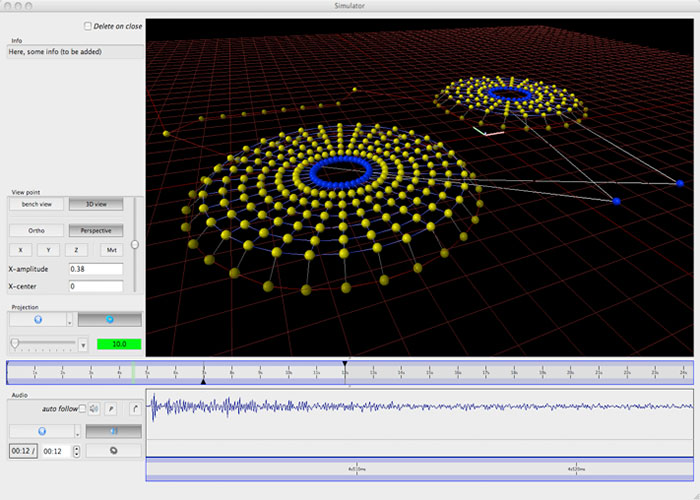
Deux gongs virtuels conçus sur l’établi du logiciel GENESIS
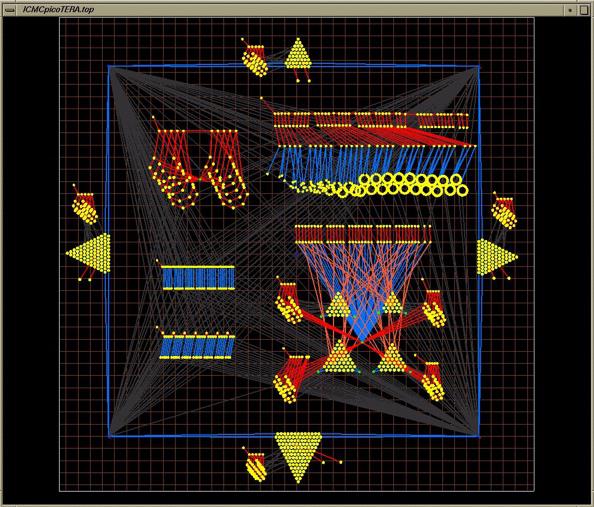
L’ensemble des instruments virtuels GENESIS de la création musicale et visuelle GAEA de Claude Cadoz ( 2007)
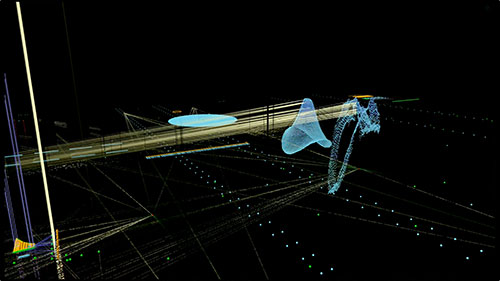
Hélios 2016 : Gong frères
Jeu instrumental temps réel avec les claviers gestuels à retour d’effort de l’ACROE
Les systèmes gestuels à retour d’effort permettent à la fois d’agir sur les instruments virtuels et ressentir l’instrument sous ses doigts comme cela se passe dans un instrument réel.
La technologie a retour d’effort développée par l’ACROE est suffisamment puissante et précise pour servir le geste instrumental musical dans toute son expressivité. Elle permet en outre de jouer à plusieurs et de communiquer avec l’autre par le geste.
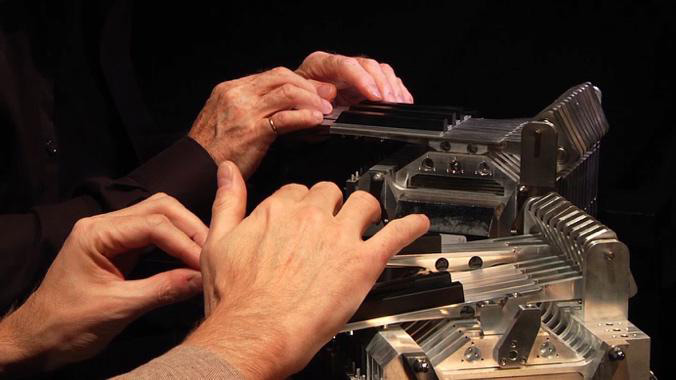
Jeu collaboratif de deux instrumentistes sur un même instrument virtuel.
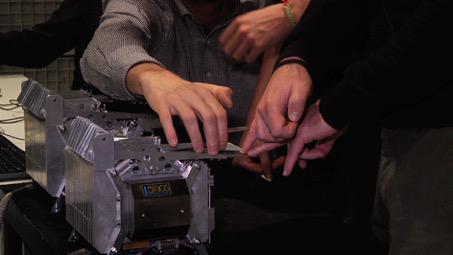
Jeu à plusieurs en ressentant le geste de l’autre.
Diffusion sonore immersive 3D sous le dôme sonore à 24 hauts parleurs de l’ACROE
La technologie du dôme sonore utilisée par l’ACROE consiste en un ensemble de haut-parleurs identiques (10, 24 à 32), puissants, précis, compacts et dont la répartition dans l’espace des méthodes change les modalités d’écoute. Le public n’est pas face aux diffuseurs mais est immergé au centre de la scène sonore dans un univers musical tridimensionnel. Sur ce dispositif matériel, l’ACROE a développé une technologie logicielle de spatialisation instrumentale.
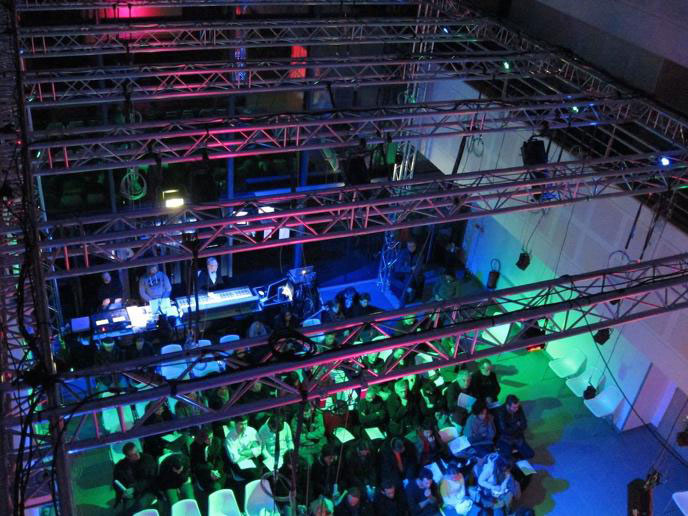
Ci-dessus, le Dôme sonore du Centre ZKM, installé dans le hall de l’école Phelma en novembre 2011 pour le festival #AST2011
« J’utilise le dôme sonore pour étendre la spatialité naturelle des instruments acoustiques, que je reproduis et travaille dans l’univers numérique. Ainsi, l’auditeur peut se trouver à l’intérieur d’un gong sonore immense sur lequel il est possible de jouer d’une façon méticuleuse et très localisée. » Claude Cadoz, Chercheur – Compositeur.
« Helicanthe » is the new interactive multisensory creative platform developed by ACROE.
The workshop takes place in a cyclic way: creating virtual musical instruments – real-time improvisation with haptic gestural feeback – listening and visualizing musical works.
The audience takes the « train on the fly” and leaves it as they want.
The duration of a cycle is about 2 hours.
This new creation tool, precise and easily programmable, allows to create virtual musical instruments, design new instrumental structures, imagine new modes of playing, generate new gesture, sound and haptic feelings and live the musical experience from the gesture to the immersive acoustical diffusion in space.
It will be permanently installed in the Olivier Messiaen Concert Hall. Several musical artworks presented in AGORA 2019 concerts have been produced and will be broadcast on this platform.
« Helicanthe » integrates all the technologies created by ACROE-ICA in Grenoble:
- TELLURIS: Haptic feedback real-time simulator of virtual musical instruments
- GENESIS: Interactive software for physical modeling of virtual instruments and instrumental scenes, for sound creation and musical composition.
- Helicanthe Corolla: Immersive multi-channel sound projection
Designing virtual musical instruments with ACROE’s GENESIS software
ACROE’s approach to musical and sound creation is based on instrumentality, as well for sound synthesis as for digital sound synthesis as for its composition. This approach allows to rediscover, in the computer world, the richness and subtlety of the sounds of acoustic instruments and objects.

Two virtual gongs designed on the GENESIS software workbench

The whole instrumental GENESIS virtual orchestra of the musical and visual creation GAEA by Claude Cadoz ( 2007)

Hélios 2016 : Gong frères
Real-time instrumental playing on the ACROE force feedback gestural keyboards
Force feedback gestural devices (or haptic devices) allow both to act on virtual instruments and to feel the instrument under its fingers as happens in a real instrument.
The force feedback technology developed by ACROE is designed as powerful and precise to serve the musical instrumental gesture in all its expressiveness.
It allows to play together and communicate with each other through gesture.

Collaborative playing of two instrumentalists on the same virtual instrument.

Playing with others by feeling each other’s gestures.
The sound dome technology used by ACROE consists of a set of identic speakers (10, 24 to 32), that are powerful, precise, and compact and whose distribution in space methods changes the way of listening. The audience is not in front of the loudspeakers but is immersed within them in a three-dimensional musical space. On this hardware system, Claude Cadoz has developed new spatialisation software technology based on spatialisation of instruments rather than the sounds.

Above, the Sound Dome of the ZKM Center, installed in the lobby of Phelma School in November 2011 for the # AST2011 festival
« My use of the sound dome is to extend the natural spatiality of musical instruments, I model and simulate in the digital world. Thus, for example, the listener is immersed within a huge gong on which it is possible for him to play in a meticulous and very localized way. » Claude Cadoz, Researcher-Composer.